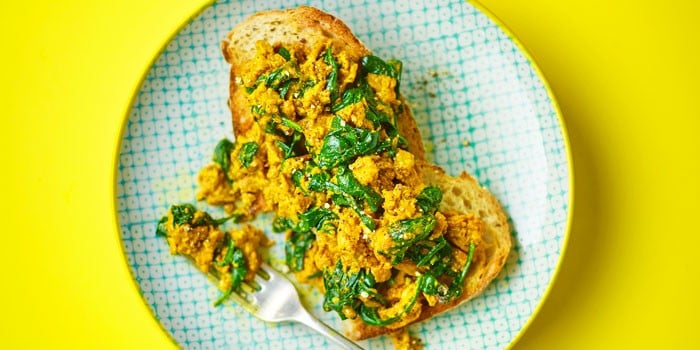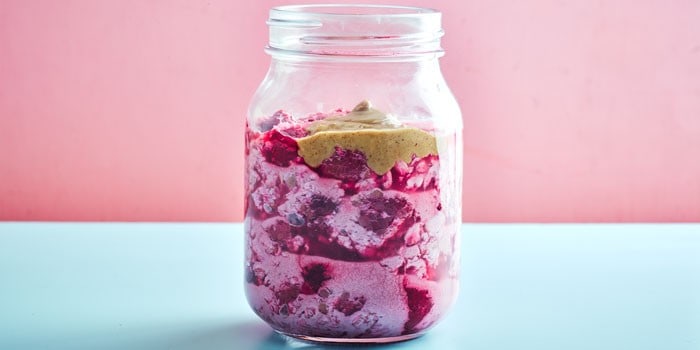Interested in trying our FREE 7-day healthy diet plan? Click here and choose between our meat eaters, vegetarian or vegan meal plans.
What is bulletproof coffee?
Bulletproof coffee, also known as butter coffee, is a high-calorie caffeinated drink made with added fat. It is intended to fuel start your day by replacing carb-heavy breakfasts. It was created by the originator of the Bulletproof diet, Dave Asprey, an American entrepreneur and author. The drink has become popular with low-carb and keto diet followers.
Read on to discover the research behind the health claims, who shouldn’t be drinking it, and if you do, the best time of day to enjoy a brew.
Discover our full range of health benefit guides and also check out our coffee recipes, including delicious drinks and bakes.
How do I make bulletproof coffee?
Bulletproof coffee combines coffee, made from high quality beans with unsalted butter and a medium chain triglyceride (MCT), such as that derived from coconut oil. The ingredients are blended together, served warm and take on the look of a creamy latte.
When do you drink bulletproof coffee?
The originator of bulletproof coffee claims a cup provides the fuel to start your day while offering a low-carb alternative to the carb-laden breakfasts that most of us are accustomed to. Its these carb-rich cereals and pastries that tend to disrupt blood sugar levels and leave us craving another sugar ‘fix’ by mid-morning.
What are the potential benefits of bulletproof coffee?
Although there’s been plenty of research into coffee consumption in general, there have been few studies specifically looking at the effects of bulletproof coffee. One study in 2021 found bulletproof coffee was no better than black coffee in improving cognitive performance. Benefits were seen in feelings of fullness – a bulletproof coffee, providing 250kcal per serving, increased feelings of satiety and reduced the expectation of food consumption after three hours.
What do we know about the benefits of coffee in general?
It’s well documented that drinking coffee, whichever way you take it, in the morning may help you feel more awake and alert, improve short term recall and reaction time with the effects potentially lasting a few hours.
Research also suggests that normal caffeine intake has an effect of increasing resting metabolic rate and thermogenesis (our bodies’ process of producing heat).
Will a bulletproof coffee fill me up?
Yes, the limited studies to date support this claim. Key components of bulletproof coffee include fats from butter and MCT oil, these appear to quash appetite, stabilise hunger and provide calories to fuel your morning. As well as being calorie-rich, butter supplies fat soluble vitamins including A, D and K, is a source of gut-friendly butyrate and supplies conjugated fats, which may help improve body fat composition.
Is bulletproof coffee good for a keto diet?
For those following a low-carb, high-fat diet, bulletproof coffee fits the ketogenic style of eating because it contains no carbs and the body converts the MCT oil to ketones. This effect is thought to be more effective in the absence of a meal.
Although recent studies examining low-carb, high-fat diets appear to suggest that on average, these diets don’t necessarily increase your levels of total and LDL cholesterol, it is worth proceeding with caution. This is because the long-term effects of this way of eating are unknown and recommendations for daily fat intake remain unchanged. Based on the available research, ketogenic diets may be associated with some improvements in cardiovascular factors including obesity, type 2 diabetes and HDL cholesterol levels, however, these effects are thought to be limited over time.
Can I include a bulletproof coffee in a weight loss programme?
MCT oil is metabolised by the liver and absorbed quickly by the body, supplying a ready source of energy. This makes it potentially useful for those seeking weight loss, although more studies are needed to validate these findings.
What are the potential downsides of bulletproof coffee?
One of the main downsides of drinking a bulletproof coffee instead of breakfast is that you’re missing out on the opportunity to eat a nutrient-dense meal. Instead, you’re consuming a drink that’s high in fat, but lacks valuable nutrients.
The fats included in bulletproof coffee are predominantly high in saturates – for example, just 1 tbsp of unsalted butter supplies 12.3g fat, more than half of which is saturates. When combined with the recommended MCT oil, one cup of bulletproof coffee will supply more than your maximum daily reference intake for saturated fat (20g) and approximately 242-354kcal per cup (depending on the amount of butter added).
It’s well known that caffeine gives us a boost, and it does this by acting as a trigger on our adrenal glands, the organs which manage our stress response. High intakes of caffeine over an extended period of time may tire the adrenal glands, which will impact our endocrine system and subsequent hormonal balance. Also, some people find that consuming caffeine triggers a stress response, and may increase the body’s reaction to perceived stress during normal daily activities, such as in a work environment. Some animal studies have also suggested that the effect of caffeine on our adrenals may be particularly relevant at certain life stages, such as during puberty.
What’s the best time of day to have a bulletproof coffee?
Bulletproof coffee is typically consumed first thing in the morning however, some experts argue that it may be better to wait until around 10am. This is because your natural cortisol levels generally peak between 8-9am, so the effect of caffeine may be more effective when they start to dip later in the morning.
Is bulletproof coffee good for you?
Although claims suggest that bulletproof coffee may prevent hunger, support energy and be a weight loss alternative to a carb-rich breakfast, there is not enough evidence to confirm this. Moderate coffee drinking may have health benefits, although adding large amounts of saturated fat to your coffee may not be good for the longer-term health of some people. As a meal replacement, bulletproof coffee makes a poor nutritional alternative to a balanced breakfast.
Is bulletproof coffee safe for everyone?
If you’re considering incorporating bulletproof coffee into your diet, it’s worth checking that your blood fats (including cholesterol) are not elevated. The current advice for those with cholesterol problems is to avoid high levels of saturated fats, including butter, in your diet.
Pregnant women and those who are breastfeeding are advised to minimise their consumption of caffeine and to eat regular balanced meals, so bulletproof coffee is unlikely to be appropriate.
For some people, who are sensitive to the effects of caffeine, regular consumption, in any form, may increase anxiety, headaches and cause sleep disturbance.
Speak to your GP if you’re concerned that your dietary choices may have an impact on your risk of illness including heart disease.
Want more like this? Try…
Is coffee good for you?
The health benefits of coconut oil
What are the health benefits of drinking water?
Best coffee machines
Have you tried bulletproof coffee? Share your experiences in the comments below…
Kerry Torrens BSc. (Hons) PgCert MBANT is a registered nutritionist with a postgraduate diploma in Personalised Nutrition & Nutritional Therapy. She is a member of the British Association for Nutrition and Lifestyle Medicine (BANT) and a member of the Guild of Food Writers. Over the last 15 years she has been a contributing author to a number of nutritional and cookery publications including BBC Good Food.
All health content on bbcgoodfood.com is provided for general information only, and should not be treated as a substitute for the medical advice of your own doctor or any other healthcare professional. If you have any concerns about your general health, you should contact your local healthcare provider. See our website terms and conditions for more information.






